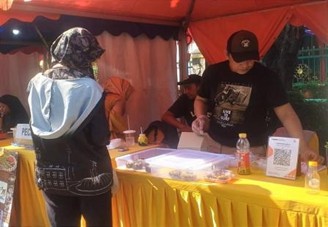Natural Soap Making Training with Business-Economic Value for Communities in Kembangan District
Main Article Content
Shinta Melzatia*
Safira
Amam
Jabar Badruzzaman
Rangga Prebawa Gumilar
The need for environmentally friendly products that are safe for health is increasing, including natural soaps that are free of harmful chemicals. Kembangan sub-district has abundant potential resources such as palm or coconut oil as the basis for making soap, but has not been optimally utilized. This community service activity aims to empower the community through training in making natural soap with business-economic value. The implementation method starts from a needs survey, preparation of training modules, soap making practices, to marketing strategies. The training participants consisted of micro and small-scale home-based businesses. The evaluation results showed active participation reaching 90%, with 80% of participants successfully making quality soap and 70% interested in developing a natural soap business. The main obstacles are limited tools, materials, and mentoring time. However, through collaboration with business partners and the government, this training can support economic independence based on MSMEs and environmental conservation. This program also encourages the formation of new business communities and increases community capacity in digital production and marketing. In conclusion, this training is effective in improving skills and opening up business opportunities based on local potential in a sustainable manner in Kembangan District.
Bakhri, S. (2020). Membangun Ekonomi Masyarakat Melalui Pengembangan IKM (Industri Kecil Menengah). CV. K-Media.
Bhujbal, O. S., Bhosale, D. V, Jangam, P. N., & Bafana, Y. S. (2023). Formulation and evaluation of herbal soap. International Journal of Future Management and Research.
Dawis, A. M., Nisa, M. K., & Setiyaningrum, B. (2024). Pemberdayaan UMKM sebagai Upaya Membangun Kemandirian Desa Cemani Sukoharjo melalui Kecerdasan Buatan. Jurnal Abdi Nusa, 4(2), 101–107. https://doi.org/10.52005/abdinusa.v4i2.258
Hamdan, H., Imaningsih, E. S., Marlapa, E., & Raharja, I. (2024). Strategi Green Marketing Hasil Kreasi Barang Bekas Karya Ibu-ibu PKK Kembangan Utara. Jurnal PkM (Pengabdian Kepada Masyarakat), 7(5), 580. https://doi.org/10.30998/jurnalpkm.v7i5.16978
Huwae, V. E., Asnawi, R. . A., Siahainenia, S., Christianty, R., Latuconsina, Z., Tamher, E. R., Saununu, S. J., & Tahapary, G. H. (2022). Revitalisasi Tata Kelola Menuju UMKM Yang Produktif Di Desa Elaar Let Kabupaten Maluku Tenggara Provinsi Maluku. Jurnal Pengabdian Kepada Masyarakat Nusantara (JPkMN), 3(2). https://doi.org/10.55338/jpkmn.v3i2.409
Junaenah, Suprapto, E., & Trihandayani, E. N. (2024). Praktek Pembuatan Sabun Herbal Untuk Perawatan Kulit Wajah, Desa Tegal, Kemang, Kab. Bogor. Jurnal Adibrata, 4(3).
Kristiana, R., & Aqmala, D. (2023). The Influence of Environmental Awareness, Environmental Awareness, Product Knowledge and Willingness to Pay on the Interest in Purchasing Eco-Friendly Products at “The Body Shop” in Semarang City. E-Bisnis?: Jurnal Ilmiah Ekonomi Dan Bisnis, 16(2), 422–436. https://doi.org/10.51903/e-bisnis.v16i2.1427
Piranda, D. R., Sinaga, D. Z., & Putri, E. E. (2022). Online Marketing Strategy In Facebook Marketplace As A Digital Marketing Tool. Journal of Humanities, Social Sciences and Business (JHSSB), 1(3), 1–8. https://doi.org/https://doi.org/10.55047/jhssb.v1i2.123
Sartika, D., Patappari, A., & Syarif, A. (2021). Penyuluhan dan pelatihan pembuatan sabun herbal alami (inovasi produk kreatif millenial for entrepreneur). Jurnal Abdimas Indonesia, 1(4), 10–18.
















